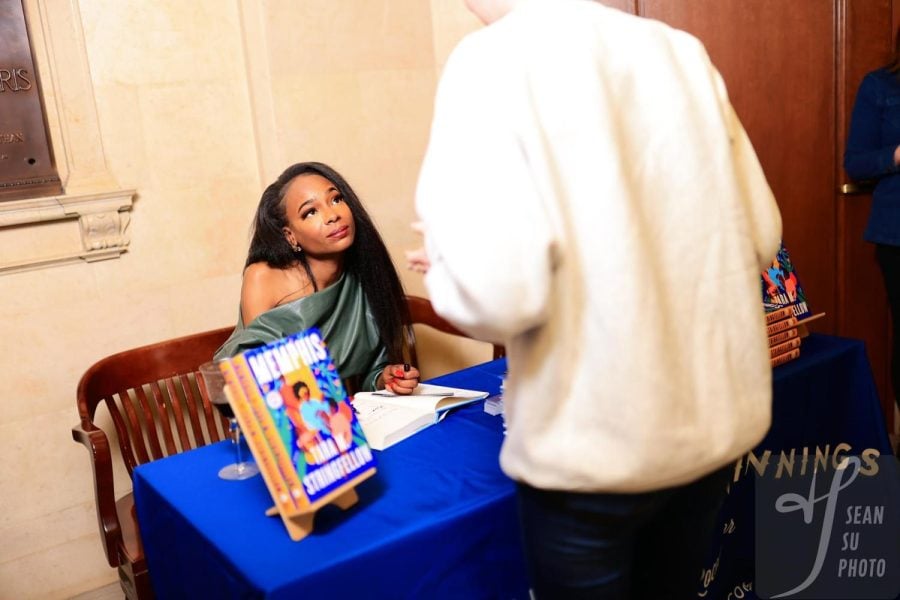Alum Tara Stringfellow pulls from her roots in debut novel ‘Memphis’
Photo courtesy of Sean Su | Purple Photo Group
Alum Tara Stringfellow’s debut novel “Memphis” was released April 5. She returned to Northwestern on Thursday to perform a reading of the book.
April 19, 2022
Memphis.
Writing that one word — the name of her city and now the title of her debut novel — was the moment Tara Stringfellow (Weinberg ’07, School of Professional Studies ’18) said she knew she was writing something special.
“You’re born a poet. It’s a calling,” Stringfellow said. “I knew I wanted to write the most beautiful, moving passages this world has ever seen.”
“Memphis,” follows 10-year-old Joan as she, along with her mother and sister, flees her father and finds refuge in Memphis. The book is a bildungsroman celebrating three generations of Black women in Joan’s ancestry and the healing, hope and love she finds through art.
“Memphis” has been featured on the Today show, Oprah Daily, Essence, Glamour, Business Insider, Marie Claire, The Millions, She Reads, Book Riot and more.
Stringfellow returned to Northwestern on Thursday to perform a reading of the novel. The reading was followed by a discussion with Whitney Frick (Weinberg ’06) and moderated by English Prof. Rachel Webster.
Stringfellow said early in her life, she was quickly drawn to reading poetry as well as the U.S. Constitution.
“I had never read anything so moving as (the Constitution) and so inapplicable to Black folk,” Stringfellow said. “Us southern Black women know a thing or two about loss and know a thing or two about victory, and how much it costs.”
Stringfellow majored in English Literature and African American studies and graduated with honors. She continued her education at Chicago-Kent College of Law and then worked in the law field.
“I was angry, really, by the injustices I saw, even as a little girl,” Stringfellow said. “And so I knew I needed to become the first attorney in my family to prove maybe to all the white folks, even at Northwestern, that a Black woman could do it. And could do it on her own.”
Following her law career, Stringfellow returned to NU to complete her Master of Fine Arts in poetry and fiction, summa cum laude. She credited her undergraduate career at NU and her law background with helping her with research aspects of the novel like finding land titles, court records, autopsy reports and more.
Many of Stringfellow’s family members attended her reading, as did her former professor, Tracy Vaughn-Manley.
Vaughn-Manley said she met Stringfellow in 2005 when the latter was a sophomore, and she went on to teach her twice a year until she graduated. The former professor praised “Memphis,” calling it a strictly Black feminist work. She said Stringfellow’s dedication to her craft was evident even as an undergraduate student.
“(Stringfellow was) always one who had a love for literature, a love for the written word,” Vaughn-Manley said. “She’s taking American writing to another level.”
Frick is the editor-in-chief of The Dial Press, the imprint of Penguin Random House that published “Memphis.” She said Stringfellow’s book was a perfect fit for the imprint’s focus on empowering women’s voices.
“(The Dial Press publishes books) by and about women and people who are gender non-conforming exploring what it really means to live well,” Frick said. “When we read ‘Memphis’ … we knew (how special this book would be).”
Stringfellow’s writing career began long before “Memphis.” She published her first poem at the age of 10 and her first poetry book as a senior at NU.
Stringfellow said “Memphis” is a gift for Black women. She wants people reading the book to know Black women have always made this country great.
“I want Black women everywhere across this world to know that I wrote something special for them and that will be on the shelf for all of time,” Stringfellow said. “That they are squarely now rooted in the Western canon … I wanted to make sure that long after I’m gone that that remains (as) a monument to them.”
Email: [email protected]
Twitter: @andresbuena01
Related Stories:
— Libraries’ book displays introduce students to new concepts and areas of literature
— Helicon fosters creativity and community through literature and art


